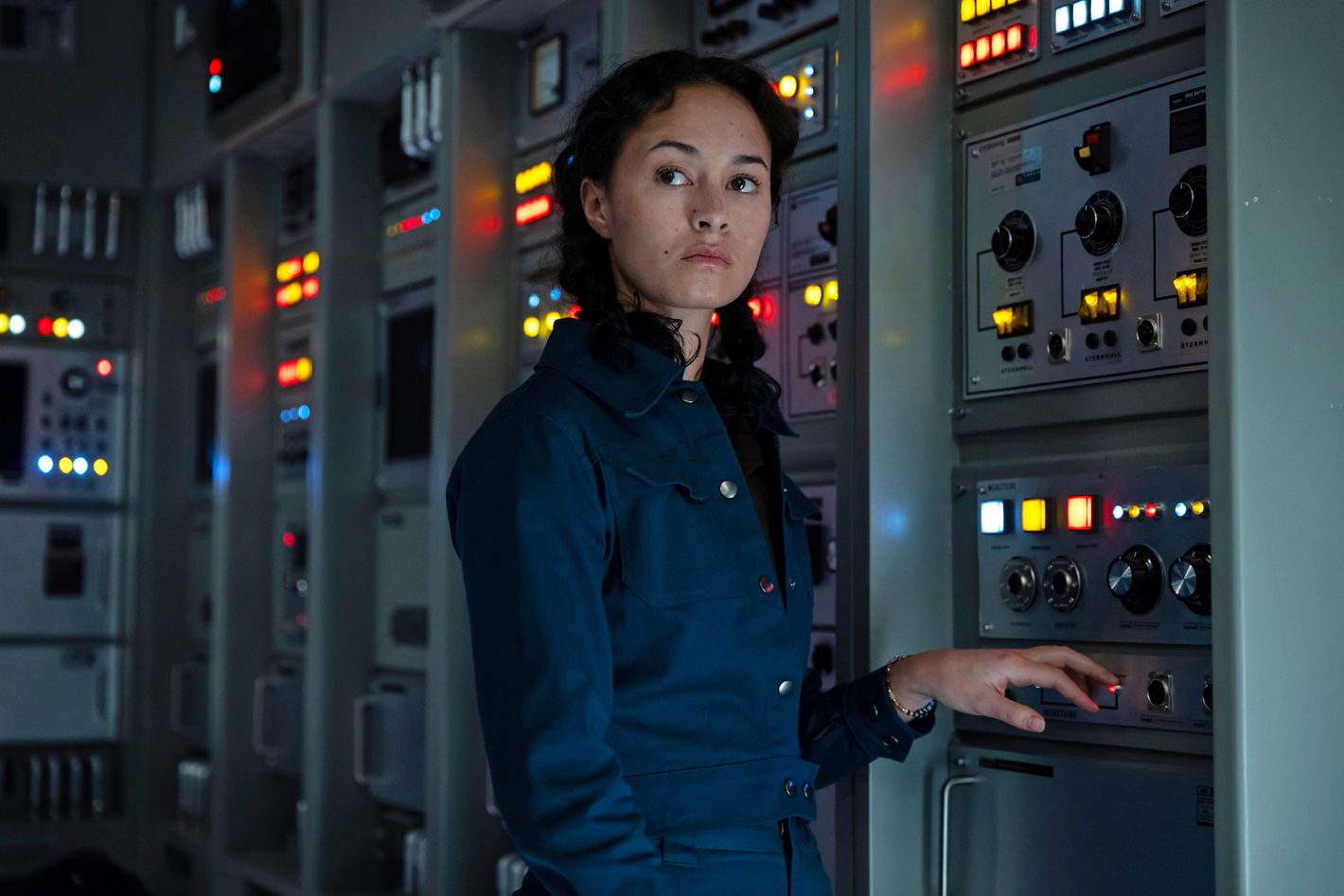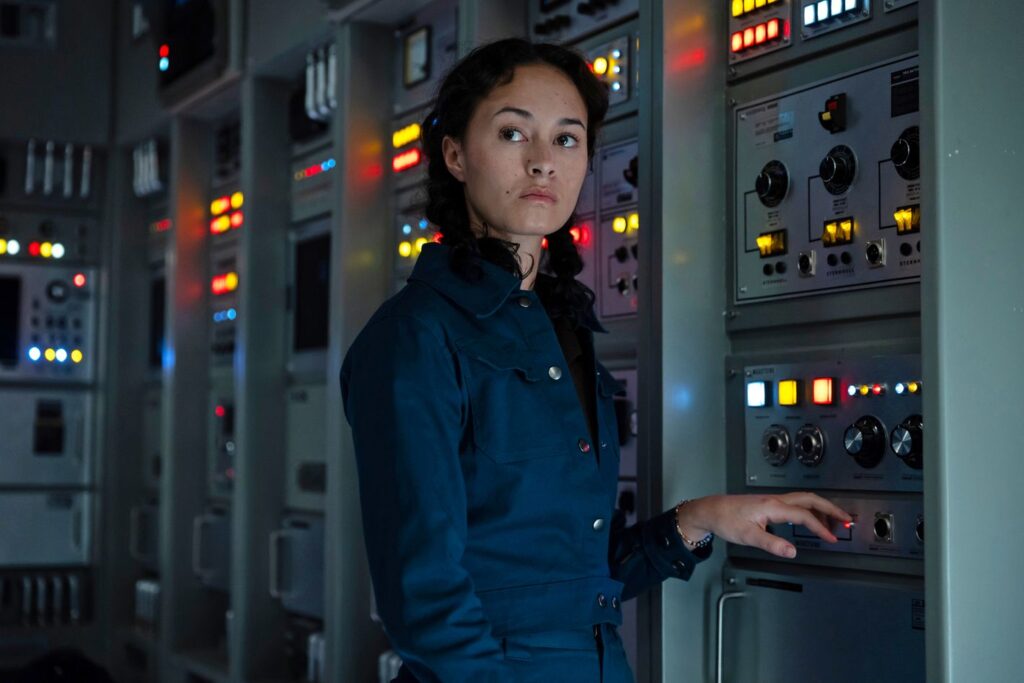
After three straight episodes of fairly relentless science-fiction/horror action — interspersed with a few quieter, quirkier moments of kid-lit fantasy — Alien: Earth slows down considerably for episode four. “Observation” is more functional than fun, seemingly aimed at setting up the back half of season one while also filling in some gaps in the characters’ backstories. There’s a lot about the Prodigy staff and their revolutionary hybrids that the Alien: Earth creator, Noah Hawley, didn’t feel the need to explain when he started this story. Here at the season’s halfway point, he takes a beat to clarify a few things.
Take Dame Sylvia. She’s been a constant presence through the first three episodes, yet I’ve barely had cause to mention her before. And until this moment, I had yet to mention her husband, Arthur Sylvia (David Rysdahl), one of the chief architects of Prodigy’s hybrid program. The Sylvias have expressed some reservations about how cavalier Boy Kavalier has been toward the hybrids’ mental and physical health. The Maginot mission has left Arthur livid. He has little respect for Kavalier’s risk-taking, because to him it’s “not science.” (“If we did this wrong, best case we have a bunch of AIs running around thinking that they’re human. Worst case? We killed six kids.”)
Dame, on the other hand, is more of a nurturer by nature, to both Kavalier and the hybrids. But even she has concerns about how these children are adjusting to having immature minds dropped into high-tech, adult-shaped bodies. In one of this episode’s best scenes, Dame tries to figure out what’s wrong with Nibs, who has been spooked since encountering the scary aliens at the Maginot crash site. The Sylvias become alarmed when Nibs claims to be pregnant. When Dame tries to explain that pregnancy is a biological process beyond Nibs’s mechanical abilities, the youngster at first waves off the sex talk — “I grew up on a farm,” she huffs — but then cites the counterexample of Jesus. (“His mommy didn’t do that, and he was born.”)
Then the conversation takes a darker turn, as Dame tries to get Nibs to admit that her new body is different. All Nibs will allow is, “It’s big,” and then when Dame tries to show her an actual diagram, Nibs kicks it angrily out of her hand. Dame then asks exactly what happened to her in New Siam, which prompts Nibs to jump at her and pin her to the ground. The sequence is incredibly disturbing, underlining the carelessness with which Prodigy has been treating these overgrown children.
Elsewhere on Neverland Island, Wendy reclaims her place as the most special of the hybrids by revealing the unique gift we’ve seen from her across the past two episodes: an ability to hear and understand the Xenomorphs’ language. While the Sylvias again are concerned about what this may mean — especially given Wendy’s other unexpected power, to manipulate technology by touching it — Kavalier is excited to see where it might lead. He reminds Dame that she isn’t Wendy’s mother. (This is “an IT issue, not a gab session,” he warns.) Then he takes a shot at the Wendy-bashing Curly, asking her if she can hear the Xenomorphs. (“Maybe,” she lies.)
As part of the “getting to know the characters a little better” direction of “Observation,” we get multiple scenes with Kavalier this week, all emphasizing how he thrives on “move fast and break stuff” tech-bro energy — combined, quirkily, with his Peter Pan obsession. When Wendy comes to talk to Kavalier, he points with his foot toward an empty seat for her, then proceeds to pepper her with questions about her Maginot experience, wondering whether fighting the Xenomorph was more like fighting pirates or Indians … or maybe a crocodile? (“You fought the crocodile and now you can hear the clock!”) He also wants to know what she hears from the Xenomorphs and is unmoved when she describes their pain.
Kavalier is not an empathetic soul. He’s a self-styled man-child, disdainful of society’s moral codes. The show hasn’t gone so far as to frame him as a villain (unless you’re the sort of viewer who thinks of Willy Wonka as a bad guy), but neither is he being shown to be “right” in any particular way (unless you’re the sort of viewer who roots for Lex Luthor). More than anything, he’s the kind of oligarch who looks for high-minded, pseudo-intellectual excuses to do what he wanted to do anyway. And Hawley does seem to want us to draw some modern-day parallels. In other words: If Kavalier were a real guy, alive today in our world, he’d probably still be a trillionaire. He’s got an undeniably musky aroma.
During Wendy’s visit, she argues that Kavalier should allow her brother to stay on Neverland Island, which the Prodigy boss agrees to very reluctantly. (When she makes a “pinkie promise” that having Hermit around won’t distract her, Kavalier covers her pinkie with his whole hand.) As for Joe, he’s not all that enthusiastic about being detained at Neverland, especially when Prodigy’s gruff business manager, Atom Eins (Adrian Edmondson), tells him that he has no choice in the matter, since he owes Prodigy for the cost of his artificial lung. Atom also laughs off the idea that Hermit could just take his sibling home, saying, “The unit you call your sister is a product of the Prodigy Corporation.” He calls her the next evolutionary step between “our animal past and our trans-human future.”
Also, not super-stoked about Hermit hanging around? Slightly, who complains it’s not fair for Wendy to have a brother. (When Wendy defends her privilege by saying she’s the oldest, Slightly notes that, actually, Curly is, since she was 12 when her consciousness was transplanted.) It doesn’t help that Slightly is receiving messages in his head from Morrow threatening to harm Slightly’s own family unless he arranges to sneak a human into the lab with the Xenomorph eggs, so they can do their face-hunting, alien-planting business. The obvious candidate for this is Hermit, whom Slightly already dislikes.
Even though all of these calmer, conversational scenes result in an episode without a lot of drive, the smaller moments do have a purpose, making one major point clear: that no one at Prodigy really knows how either their hybrid experiment or their alien studies are going to turn out. Both situations are moving very quickly, in directions no one could’ve predicted. To the Sylvias, this is terrifying. To Kavalier, thrilling. And to Kirsh? Well, he just watches it all quietly, occasionally muttering, “Fascinating.”
Anyway, after an episode with a lot of talk, Alien: Earth returns to its usual mode of unnerving suspense and gooey violence in this episode’s final minutes. There’s a lot of intrigue, as we see Kirsh remotely monitoring Slightly, and Slightly eyeing Hermit. Meanwhile, Wendy enters the lab to chat with the aliens, using a language that consists of clicks and sighs — like a swarm of insects nesting in a windswept forest. This eerie music eventually coaxes out the creature rooted in Hermit’s amputated lung. That embryonic Xenomorph then shatters its container and leaps at Wendy, who pets it gently.
Who knew? It seems one of these hybrids may be capable of motherhood after all.
Screaming, Hearing, Etc.
• For the first time since the season premiere (at least by my reckoning), the opening-credits “previously on” imagery features something we haven’t actually seen before: a creepy-looking doll’s head washing onto a beach with the tide.
• In one of the clumsier bits of backstory filling, Curly asks Hermit to explain “the Five,” and he mentions the corporations — Prodigy, Weyland-Yutani, Threshold, Dynamic, and Lynch — that took the place of world governments and democracy and “fixed things.” It seems unlikely that Curly wouldn’t already know this, although I did like how Hermit just accepts that it’s better for the corporations to be in charge, since he’s never known anything else.
• My favorite Maginot menagerie beastie remains the multi-eyed crawling eyeball, who in this episode takes up residence within the eye socket of a Prodigy lab goat. Observing this process, Atom expresses concern about one of these monsters escaping, to which Kavalier says, “Glass half-full, kid … we talked about this.”
• One of my favorite little bits of physical business in this episode is when Wendy shows Hermit around her bedroom — with a bed that’s “more like a charging station” — and she surreptitiously kicks her toys out of sight so the space won’t look so cluttered or childish.
• Hermit poses some good questions to Atom about Wendy, like, “She has her memories, her sense of humor … doesn’t that make her Marcy?” He also asks, “Did you really download her consciousness to that body? Is it her?” Atom replies that answering those questions is the difference between a trillion-dollar business and “a blanket with sleeves … an invention that no one wanted.”
• The hybrids don’t need to eat in any conventional human sense, but apparently the Prodigy engineers have concocted for them a kind of digital candy, which simulates the memory of flavor. Neat!
• Just like Curly last week, another one of the more intelligent and ambitious hybrids, Tootles (Kit Young), tries to impress the Prodigy bosses with his diligence and cleverness. He even has the nerve to ask Kirsch to call him by a non–Peter Pan name, picking “Isaac” for himself, after “this scientist.” (When he tells Slightly about the name change, Slightly asks, “We can do that?” Isaac’s nonchalant reply: “Don’t know about ‘can,’ but I did.”)
• I’ve been watching Rysdahl as Arthur for weeks now and at no point before this episode did I realize that I’d seen him before in a Noah Hawley show, playing the sweet, meek Wayne Lyon in Fargo season five.
• Boy Kavalier cites that old saying about how, at a certain level, science is indistinguishable from magic. He credits it to Isaac Asimov. Does anyone at Prodigy have the courage to tell him that the quote is actually from Arthur C. Clarke?
The Prodigy staff is starting to wonder if putting children in adult robot bodies was a good idea after all.

































































